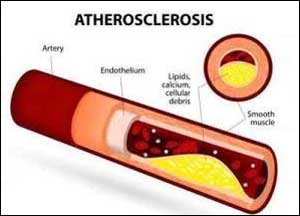- Home
- Editorial
- News
- Practice Guidelines
- Anesthesiology Guidelines
- Cancer Guidelines
- Cardiac Sciences Guidelines
- Critical Care Guidelines
- Dentistry Guidelines
- Dermatology Guidelines
- Diabetes and Endo Guidelines
- Diagnostics Guidelines
- ENT Guidelines
- Featured Practice Guidelines
- Gastroenterology Guidelines
- Geriatrics Guidelines
- Medicine Guidelines
- Nephrology Guidelines
- Neurosciences Guidelines
- Obs and Gynae Guidelines
- Ophthalmology Guidelines
- Orthopaedics Guidelines
- Paediatrics Guidelines
- Psychiatry Guidelines
- Pulmonology Guidelines
- Radiology Guidelines
- Surgery Guidelines
- Urology Guidelines
Anti-inflammatory drugs not yet for Atherosclerosis-ESC Consensus statement

European Society of Cardiology (ESC) has released its latest consensus statement on inflammation in atherosclerosis which has been published in the European Journal of Preventive Cardiology.
The document prepared by the ESC Working Group on Atherosclerosis and Vascular Biology has concluded that more evidence is needed before anti-inflammatory drugs can be added to statins as standard treatment to prevent cardiovascular events in patients with atherosclerosis.
CANTOS) study released at ESC Congress 2017 earlier had shown that by reducing inflammation, the interleukin (IL)-1β inhibitor canakinumab lowers the risk of another cardiovascular event in patients who had a prior heart attack. The results of the Canakinumab Anti-inflammatory Thrombosis Outcome Study (CANTOS) have prompted ESC to issue this statement.
The consensus paper outlines the links between high cholesterol and inflammation and highlights the evidence that is now needed so that lowering both cholesterol and inflammation can become dual targets in the prevention of cardiovascular disease.
There are numerous connections between high cholesterol and inflammation. Low-density lipoprotein (LDL) cholesterol in the artery wall triggers inflammation. High cholesterol and inflammation are independently associated with an increased incidence of cardiovascular events. Lipid-lowering medications lower the risk of atherosclerotic cardiovascular events, and also have anti-inflammatory effects. The CANTOS trial then showed that anti-inflammatory drugs reduce the incidence of cardiovascular events.
Dr José Tuñón, first author of the statement and a cardiologist at the University Hospital Fundación Jiménez Díaz, Madrid, Spain, said: “We are on the cusp of a new era in cardiovascular disease prevention. The basis of protection against cardiovascular disease will continue to be a healthy lifestyle, including not smoking, being physically active, and eating healthy food. In addition, several drugs such as lipid-lowering medication and antithrombotic therapies have proven to be useful in the prevention of cardiovascular events. With further evidence, anti-inflammatory drugs could become one more tool in the treatment of atherosclerosis.”
CANTOS used a human monoclonal antibody (canakinumab) to suppress inflammation by neutralizing IL-1β signaling. The authors of the consensus paper state that studies are needed to test whether tools other than antibodies – interference RNAs, for example – can interfere with inflammation. In addition, research should examine if targeting different inflammatory molecules reduces cardiovascular events.
Clinical trials are also needed to extend the findings with anti-inflammatory drugs beyond the patient population enrolled in CANTOS. Patients in the trial had elevated levels of high-sensitivity C-reactive protein (CRP), a marker of inflammation, and the median LDL cholesterol level was 82.4 mg/dL.
Dr Tuñón said: “LDL-lowering drugs are effective regardless of CRP levels, so we need to know if the same is true for anti-inflammatory medications. European prevention guidelines recommend lowering LDL cholesterol to less than 70 mg/dL to prevent recurrent cardiovascular events.3 We need a clinical trial in patients who have achieved the LDL cholesterol target of less than 70 mg/d to see if anti-inflammatory drugs can lower their cardiovascular risk even further.”
He concluded: “There is a large and strong body of evidence showing that lipid-lowering drugs reduce the risk of cardiovascular disease. Anti-inflammatory drugs will not replace lipid-lowering drugs, but look set to become a complementary therapy in patients with atherosclerosis.”

Disclaimer: This site is primarily intended for healthcare professionals. Any content/information on this website does not replace the advice of medical and/or health professionals and should not be construed as medical/diagnostic advice/endorsement or prescription. Use of this site is subject to our terms of use, privacy policy, advertisement policy. © 2020 Minerva Medical Treatment Pvt Ltd